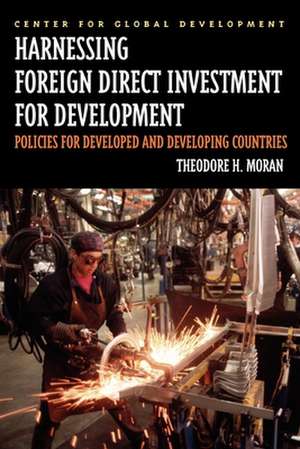Harnessing Foreign Direct Investment for Development: Policies for Developed and Developing Countries
Autor Theodore H. Moranen Limba Engleză Paperback – 29 sep 2006
Is foreign direct investment good for development? Moving beyond the findings of his previous book Does Foreign Direct Investment Promote Development? (CGD and IIE, 2005), Theodore H. Moran presents surprisingly good—and startlingly bad—news. The good news highlights how foreign direct investment can make a contribution to development significantly more powerful and more varied than conventional measurements indicate. The bad news reveals that foreign direct investment can also distort host economies and polities with consequences substantially more adverse than critics and cynics have imagined. This book rigorously examines the principal controversies and debates about FDI in manufacturing and assembly, extractive industries, and infrastructure, in light of new evidence and analysis. Written in engaging prose, it identifies how developed and developing countries, multilateral lending agencies, and civil society can work in concert to harness foreign direct investment to promote the growth and welfare of developing countries.
Preț: 87.62 lei
Preț vechi: 134.31 lei
-35% Nou
Puncte Express: 131
Preț estimativ în valută:
16.78€ • 17.29$ • 14.06£
16.78€ • 17.29$ • 14.06£
Carte indisponibilă temporar
Doresc să fiu notificat când acest titlu va fi disponibil:
Se trimite...
Preluare comenzi: 021 569.72.76
Specificații
ISBN-13: 9781933286099
ISBN-10: 1933286091
Pagini: 192
Dimensiuni: 152 x 229 x 11 mm
Greutate: 0.27 kg
Editura: Brookings Institution Press
Colecția Center for Global Development
ISBN-10: 1933286091
Pagini: 192
Dimensiuni: 152 x 229 x 11 mm
Greutate: 0.27 kg
Editura: Brookings Institution Press
Colecția Center for Global Development
Notă biografică
Theodore H. Moran is a nonresident fellow at the Center for Global Development and holds the Marcus Wallenberg Chair at the School of Foreign Service, Georgetown University. He is founder and director of the Landegger Program in International B
Descriere
Is foreign direct investment good for development? Moving beyond the findings of his previous book Does Foreign Direct Investment Promote Development? (CGD and IIE, 2005), Theodore H. Moran presents surprisingly good—and startlingly bad—news. The good news highlights how foreign direct investment can make a contribution to development significantly more powerful and more varied than conventional measurements indicate. The bad news reveals that foreign direct investment can also distort host economies and polities with consequences substantially more adverse than critics and cynics have imagined. This book rigorously examines the principal controversies and debates about FDI in manufacturing and assembly, extractive industries, and infrastructure, in light of new evidence and analysis. Written in engaging prose, it identifies how developed and developing countries, multilateral lending agencies, and civil society can work in concert to harness foreign direct investment to promote the growth and welfare of developing countries.
